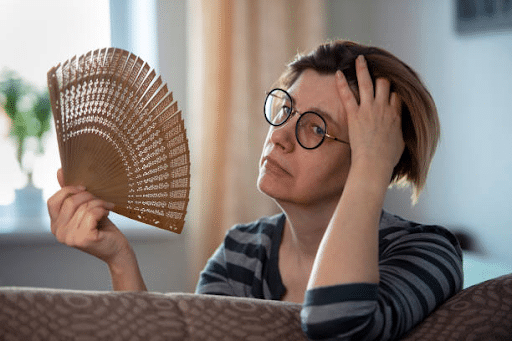From Hot Flashes to Mood Swings: Personalized Approaches from A Menopause Specialist
Menopause is a natural phase of life, but for many women, it can feel like an unpredictable storm. From hot flashes that strike out of nowhere to mood swings that can make you feel like a stranger to yourself, menopause brings a variety of symptoms that can disrupt your daily life. But there’s good news: menopause specialists are here to help with personalized treatment plans that can make this transition smoother and more manageable.
The Rollercoaster of Menopause
Imagine you’re at work, and suddenly, you’re drenched in sweat. Or you’re having a pleasant evening with family when a wave of irritability hits you out of nowhere. These experiences are common during menopause. The hormonal changes during this time affect each woman differently, making the symptoms unpredictable and varied. According to the Journal of Midlife Health, up to 80% of women experience hot flashes 1during menopause, and mood swings are also frequently reported.

Understanding the Science
Menopause typically occurs in women between the ages of 40 and 58, marking the end of menstrual cycles. It’s diagnosed after you’ve gone 12 months without a menstrual period. The main culprit behind menopausal symptoms is the decline in estrogen and progesterone levels. These hormones play a crucial role in regulating many bodily functions, including temperature control and mood stability.
Hot flashes, for instance, are believed to be caused by changes in the brain’s hypothalamus, which regulates body temperature. As estrogen levels drop, the hypothalamus becomes more sensitive to slight changes in body temperature, triggering hot flashes as a response. Similarly, fluctuations in hormone levels can affect neurotransmitters in the brain, leading to mood swings and emotional changes.
The Importance of Personalized Treatment
Given the complex nature of menopause, a one-size-fits-all approach to treatment often falls short. That’s where menopause specialists come in. These experts understand that every woman’s experience with menopause is unique, and they tailor treatment plans to address individual symptoms and needs.
A personalized treatment plan may include:
1. Hormone Replacement Therapy (HRT): For some women, HRT can effectively manage symptoms by replenishing the body’s hormone levels. In fact, it is the most effective method and The North American Menopause Society and other organizations state that the benefits outweigh the risks. Specialists can adjust the type and dosage of hormones to suit your specific needs, minimizing risks and maximizing benefits.
2. Lifestyle Modifications: Simple changes like no smoking, reducing alcohol, adjusting your diet, incorporating regular exercise, and practicing stress-reduction techniques (like yoga or meditation) can have a significant impact on managing symptoms.
3. Non-Hormonal Medications: For women who can’t or prefer not to use HRT, there are other medications available. Antidepressants, for example, can help with mood swings and hot flashes.
4. Natural Remedies: Some women find relief with natural remedies such as phytoestrogens (plant-based estrogens such as rhaptonic rhubarb), herbal supplements such as black cohosh, and acupuncture. While these options may not work for everyone, they can be a valuable part of a personalized treatment plan.
The Human Touch: Empathy and Support
Beyond the science and treatments, what truly makes a difference is the human touch. Menopause specialists provide empathy and support, creating a safe space for women to discuss their symptoms and concerns without judgment. This compassionate care is vital in helping women feel understood and supported during this transitional period.
Taking Action: Your Next Steps
If you’re experiencing menopausal symptoms, don’t suffer in silence. Here are some actionable steps you can take:
1. Consult a Specialist: Seek out a menopause specialist who can provide a thorough evaluation and develop a personalized treatment plan.
2. Educate Yourself: Understanding the science behind menopause can empower you to make informed decisions about your treatment options. Is HRT for You? Is a course that gives you the latest research and assessments so you can make an informed decision as well as know what to expect. .
3. Communicate: Openly discuss your symptoms and concerns with your healthcare provider. The more they know, the better they can help you.
4. Join a Support Group: Connecting with other women going through the same experience can provide emotional support and valuable insights.
Conclusion
Menopause may be a challenging phase, but with the right support and personalized treatment, it doesn’t have to be overwhelming. By working with a menopause specialist, you can find relief from hot flashes, mood swings, and other symptoms, allowing you to embrace this new chapter of life with confidence and ease.
Remember, you’re not alone on this journey. There’s a community of experts and fellow women ready to support you every step of the way.
By addressing menopause with personalized care, we can turn a potentially tumultuous transition into a manageable and even empowering experience. Reach out, seek help, and know that relief is within reach. Apply for a no obligation clarity call to see if we are a good fit. We can guide you through highly effective diet and lifestyle strategies anywhere and if you are in NY, NJ, PA or FL I can see you personally.
References:
- Bansal R, Aggarwal N. Menopausal Hot Flashes: A Concise Review. J -Life Health. 2019;10(1):6-13. doi:10.4103/jmh.JMH_7_19
- Perimenopause, Early Menopause Symptoms | The North American Menopause Society, NAMS. Accessed June 7, 2024. https://www.menopause.org/for-women/menopauseflashes/menopause-symptoms-and-treatments/menopause-101-a-primer-for-the-perimenopausal
- Freedman RR. Pathophysiology and treatment of menopausal hot flashes. Semin Reprod Med. 2005;23(2):117-125. doi:10.1055/s-2005-869479
- “The 2022 Hormone Therapy Position Statement of The North American Menopause Society” Advisory Panel. The 2022 hormone therapy position statement of The North American Menopause Society. Menopause N Y N. 2022;29(7):767-794. doi:10.1097/GME.0000000000002028
- Duralde ER, Sobel TH, Manson JE. Management of perimenopausal and menopausal symptoms. BMJ. 2023;382:e072612. doi:10.1136/bmj-2022-072612
- Rotolo O, Zinzi I, Veronese N, et al. Women in LOVe: Lacto-Ovo-Vegetarian Diet Rich in Omega-3 Improves Vasomotor Symptoms in Postmenopausal Women. An Exploratory Randomized Controlled Trial. Endocr Metab Immune Disord Drug Targets. 2019;19(8):1232-1239. doi:10.2174/1871530319666190528101532
- Cano A, Marshall S, Zolfaroli I, et al. The Mediterranean diet and menopausal health: An EMAS position statement. Maturitas. 2020;139:90-97. doi:10.1016/j.maturitas.2020.07.001
- Nelson HD, Vesco KK, Haney E, et al. Nonhormonal therapies for menopausal hot flashes: systematic review and meta-analysis. JAMA. 2006;295(17):2057-2071. doi:10.1001/jama.295.17.2057
- Chen M n., Lin C c., Liu C f. Efficacy of phytoestrogens for menopausal symptoms: a meta-analysis and systematic review. Climacteric. 2015;18(2):260-269. doi:10.3109/13697137.2014.966241
- Shams T, Setia MS, Hemmings R, McCusker J, Sewitch M, Ciampi A. Efficacy of black cohosh-containing preparations on menopausal symptoms: a meta-analysis. In: Database of Abstracts of Reviews of Effects (DARE): Quality-Assessed Reviews . Centre for Reviews and Dissemination (UK); 2010. Accessed June 7, 2024. https://www.ncbi.nlm.nih.gov/books/NBK79338/
- Kaszkin-Bettag M, Beck S, Richardson A, Heger PW, Beer AM. Efficacy of the special extract ERr 731 from rhapontic rhubarb for menopausal complaints: a 6-month open observational study. Altern Ther Health Med. 2008;14(6):32-38.





She is a recognized and award-winning holistic, functional, integrative and anti-aging healthcare practitioner, speaker and author, and has been featured in ABC News, Forbes, WOR Radio and many media outlets to spread the word that you can live younger and healthier at any age.